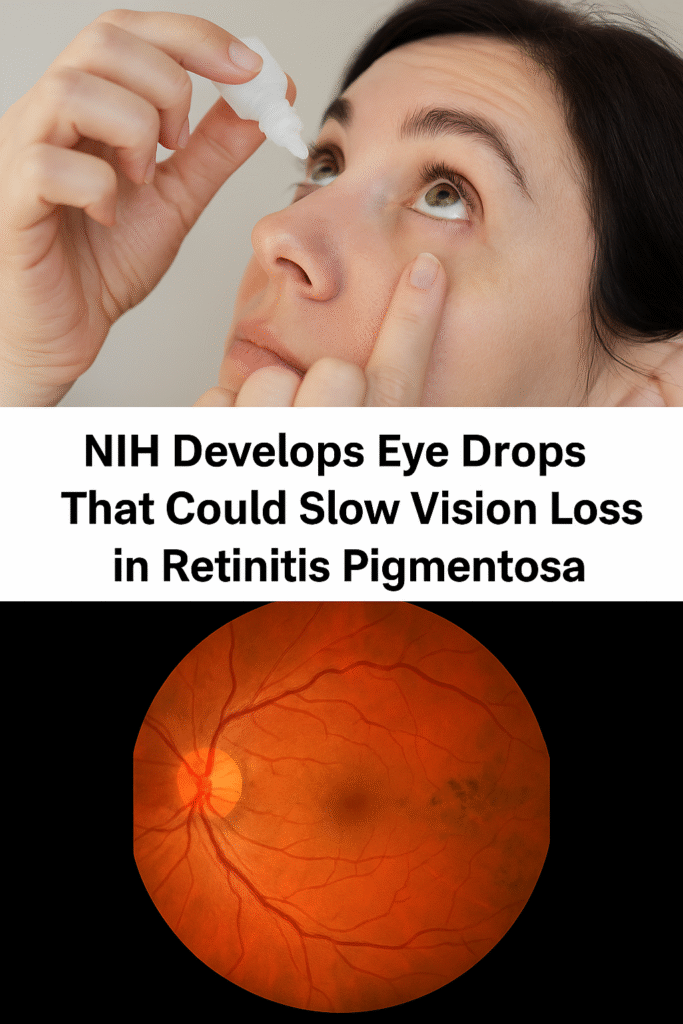Scientists at the National Institutes of Health (NIH) https://www.nih.gov/ have developed promising eye drops that could help slow down vision loss in people suffering from retinitis pigmentosa (RP) and other degenerative eye diseases. While not a cure, these drops have shown great potential in animal studies, offering hope to millions facing progressive blindness.
What’s Retinitis Pigmentosa?
Retinitis pigmentosa (RP) is a group of inherited eye diseases that gradually lead to vision loss and, eventually, blindness. It happens because the light-sensitive cells in the retina, called photoreceptors, slowly die due to various genetic mutations. Currently, there’s no universal treatment for RP, and managing its progression remains a significant challenge.

The Science Behind the Eye Drops
The new eye drops are based on a small fragment of a natural protein called Pigment Epithelium-Derived Factor (PEDF). This protein is already found in our eyes and is known for protecting retinal cells. However, the full-sized PEDF molecule is too large to pass through the eye’s outer layers, making it unsuitable as a direct treatment https://doi.org/10.1038/s43856-025-00789-8 .
Dr. Patricia Becerra and her team at NIH’s National Eye Institute (NEI) found a way around this. They designed short peptides—tiny fragments derived from the active region of PEDF—that can easily penetrate the eye’s surface and reach the retina.https://www.nei.nih.gov/about/news-and-events/news/scientists-unravel-function-sight-saving-growth-factor
Two peptides were tested:
- 17-mer: A 17-amino acid fragment from PEDF.
- H105A: A modified version that binds more strongly to retinal receptors.
How Do These Drops Work?
In the study, when these peptides were applied as eye drops to mice with RP-like disease, they quickly reached the retina within 60 minutes and remained active for up to 48 hours. Importantly, no toxicity or side effects were observed.
In mice prone to rapid photoreceptor loss, daily application of the H105A peptide resulted in up to 75% of photoreceptors being preserved, compared to severe cell loss in untreated mice. These treated mice also retained much better vision.
“For the first time, we show that eye drops can deliver therapeutic peptides directly to the retina and protect vision,” said lead researcher Alexandra Bernardo-Colón.
Could This Lead to Human Treatments?
The team also tested the peptides in human retinal tissue grown in the lab. Under stress conditions that mimic retinal degeneration, these tissues survived much longer when treated with the peptides, indicating potential for human therapy.
What’s even more exciting is that these peptides could keep retinal cells alive long enough to make future gene therapies more effective. In collaboration with researchers from Italy, they combined the peptide eye drops with gene therapy in mice and found that this approach successfully preserved vision for at least six additional months.
What’s Next?
With these encouraging results, the NIH researchers are hopeful that human clinical trials could soon begin. These PEDF-derived eye drops may become a simple, non-invasive option to slow the progression of retinal diseases like RP and dry age-related macular degeneration (AMD) while more permanent gene therapies are being developed.
The research was supported by several organizations, including NIH’s Intramural Research Program, Prevention of Blindness Society, Fondazione Telethon, and Research to Prevent Blindness.
In summary: These innovative eye drops aren’t a cure yet, but they could significantly delay vision loss for people suffering from degenerative eye diseases, buying valuable time until more advanced treatments become available.
Stay tuned to nichesystema.com for more such updates!


